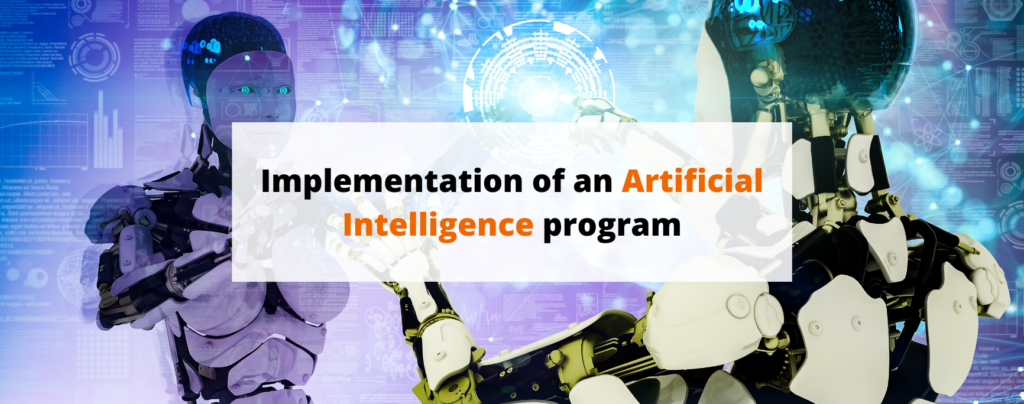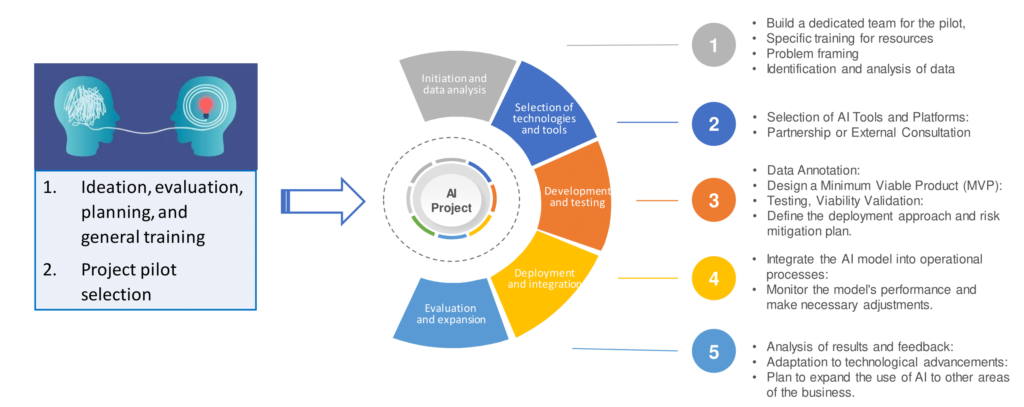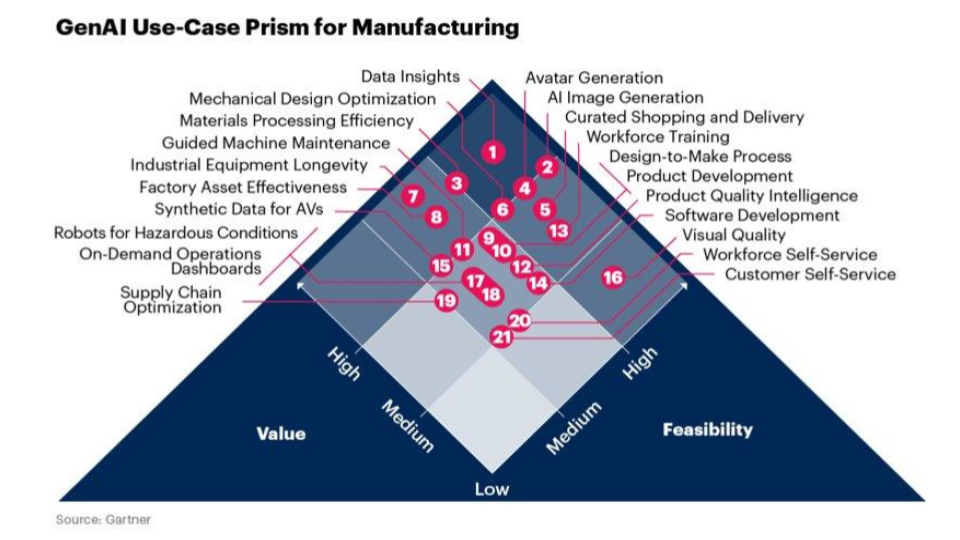Implementation of an Artificial Intelligence program

In 2022, Eficio released a white paper on the organizational and human aspects of implementing AI within organizations (downloadable here). This white paper emphasized several key aspects, including the importance of training, organizational considerations, and change management to ensure successful AI adoption.
The white paper also highlighted the need to overcome cultural and organizational barriers, such as silo thinking, traditional working methods, and rigidity. For successful AI adoption, it is crucial to transition to interdisciplinary collaboration, data-driven decision-making, and an agile, experimental, and adaptable culture. Leaders must prepare and motivate the workforce for this change by providing a clear vision and anticipating barriers to change.
This article now proposes a methodological approach to the governance and deployment of AI within an organization.

Types of AI Projects
Artificial Intelligence (AI) manifests in various forms, each requiring a specific level of preparation and maturity:
Generative AI using generic models: This form of AI is accessible, utilizing pre-existing models adapted for general applications. It requires a basic understanding of AI technologies and agility in integrating external solutions.
Integration of AI into Commercial Off-The-Shelf (COTS) software products: This adds complexity by embedding AI into existing software solutions, demanding a deeper comprehension of interactions between AI and existing systems, as well as the ability to assess the suitability and added value of AI for specific applications.
In-house development of AI solutions: This represents the highest level of maturity, especially in terms of data governance. This type of project demands in-depth technical expertise, a robust data infrastructure, and rigorous governance to ensure the accuracy, security, and compliance of utilized data.
Each type of AI project presents unique challenges and requires distinct preparation, reflecting the increasing diversity and complexity in the field of artificial intelligence.
Establishing an AI Program
The following diagram outlines Eficio’s approach to initiating an AI journey.

Figure 1: Implementation of an AI Program
Ideation, Evaluation, and Planning
Ideation, to identify promising AI projects, is a crucial process for bringing out the most promising AI projects. The key to generating successful use case ideas lies in aligning these initiatives with the strategic priorities of the company while leveraging the transformative potential of AI.
To demonstrate the seriousness of the ideation process and mobilize resources, it is recommended to allocate a discretionary budget dedicated to implementing 1 or 2 AI projects within a specified timeframe. This budget should be communicated to teams as a commitment to proactively develop this technology for the growth and performance of the company. The seriousness of the approach, supported by the leadership team, becomes more engaged and significantly supported if an investment amount is reserved for the implementation of pilot projects. The company must be ready to write off this R&D amount in case of project failures but also to reinvest more in case of success.
To begin, ideation sessions should bring together people from different departments, including those not traditionally associated with technology but with some mastery of business processes. This allows for gathering a diverse range of insights and perspectives. The use of structured brainstorming techniques, such as brainstorming or design thinking, can encourage participants to think beyond conventional applications of AI. The goal is to determine where AI can not only optimize existing processes but also create new value-added opportunities. Gartner’s Use Case Prism can also be used to identify value versus feasibility/maturity of different technologies or use cases.

Figure 2 – Example GenAi Use Case Prims for Manufacturing
Choosing the Right Pilot Project
Choosing the first AI pilot project is crucial as it can set the tone for future initiatives and influence the perception of AI within the organization. Specifically, selecting a good pilot project is essential because it can:
- Demonstrate the value of AI: A successful project can concretely demonstrate the benefits of AI, gain the trust of stakeholders, and pave the way for more ambitious initiatives.
- Learn and adapt: A pilot project offers an opportunity to learn and understand the specific challenges related to AI in your organizational context.
- Risk management: A well-chosen project helps manage risks by starting with a smaller and less complex initiative. The “Fail fast” and disposable approach may be relevant.
- Create a model for future projects: The success of a pilot project can serve as a model for future AI initiatives, improving the approach with lessons learned.
To control risks and encourage the selection of projects with the greatest chance of success, it is advisable to use a Minimum Viable Product (MVP) or prototyping approach. This is a way to quickly and inexpensively test a product idea by creating extremely simplified versions of the product to help validate the principle that “if we build it, they will use it.”
Key elements to consider when selecting a good AI pilot project include:
Alignment with strategic objectives: The project must align with the company’s strategic objectives. It should aim to solve a relevant business problem or exploit a strategic opportunity, ensuring its importance to the business and facilitating stakeholder support.
Data viability: Ensure that you have the necessary data to train and test your AI model. The quality, quantity, accessibility, and relevance of data are fundamental to the success of any AI project.
Technical complexity and feasibility: For a first project, it is advisable to choose an application with a manageable level of complexity. Avoid overly ambitious projects that could lead to unforeseen delays or costs.
Measurable impact: The project must have a measurable impact on the business, whether in terms of operational efficiency, cost reduction, improvement of customer experience, or other key performance indicators.
Available expertise: Ensure that the necessary skills and expertise are available, either internally or through external partners. This includes not only technical AI skills but also knowledge of the relevant domain.
Risks and compliance: Evaluate associated risks, including security, privacy, and regulatory compliance. A pilot project must comply with security, ethical, and legal standards.
Possibility of extension and scalability: Consider the potential for extension and scalability of the project. A good pilot project should offer the possibility of being extended or adapted for other applications within
Stakeholder Engagement: Stakeholder engagement is crucial for the success of the project. It is important to involve end users and decision-makers from the beginning of the project to ensure their support and adoption.
Healthy Data Governance, an Essential Element of AI:
Data governance is a fundamental pillar for the success of artificial intelligence (AI) projects, playing a decisive role in the quality and efficiency of developed solutions. Indeed, the value of an AI project inherently relies on the quality and relevance of the processed data. Well-managed, accurate, complete, and relevant data enable the creation of more reliable and efficient AI models, capable of generating precise insights and making informed decisions. Conversely, poorly managed or low-quality data can lead to erroneous conclusions, negatively impacting process efficiency and result credibility. Data governance ensures not only compliance with ethical and regulatory standards but is also crucial to guarantee that AI projects are built on solid foundations.
AI Governance:
Eficio’s Chief Information Officers (CIOs) are usually involved in the initial phases of AI projects, such as ideation, evaluation, planning, assessment of data governance, selection of appropriate pilot projects, partner selection, and project management.
The path to success in artificial intelligence (AI) projects is closely linked to an organization’s digital maturity, a journey that begins with information technology (IT) governance. This strong foundation in IT is crucial to ensuring a robust and secure infrastructure conducive to technological innovation. The next milestone in this trajectory is data governance, where the collection, processing, and utilization of data are optimized for integrity, precision, and compliance—key elements to fuel reliable AI systems. Finally, AI or innovation governance represents the pinnacle of this evolution. This holistic approach, integrating IT, data, and AI governance, is fundamental to creating an environment where AI projects can not only emerge but also thrive, ensuring that technology is in perfect harmony with the organization’s goals and values.
The management of AI projects is similar to many digital transformation projects, with important specificities to master. AI project management stands out due to the necessity of a team equipped with specialized AI skills, an understanding of data to train accurate models, and an agile approach for rapid experimentation and iteration. Strong ethical considerations and appropriate change management are required to navigate the implications of new AI technologies. The process often involves creating a prototype (MVP) to test and refine solutions, followed by continuous monitoring to ensure consistent performance of AI systems.
Funding:
Several university research organizations and non-profits associated with AI are actively seeking promising projects. Eficio can help connect you with these organizations or with partners in government programs, allowing you to leverage various grant and funding programs offered by different government levels and associated agencies.
Do you have an opportunity in mind? Contact us to learn more about the steps to implement an AI program within your organization!
More articles on the artificial intelligence file:
And our white paper that you can obtain here ⬇️
Subscribe to the Eficio newsletter and be the first to receive our updates!

